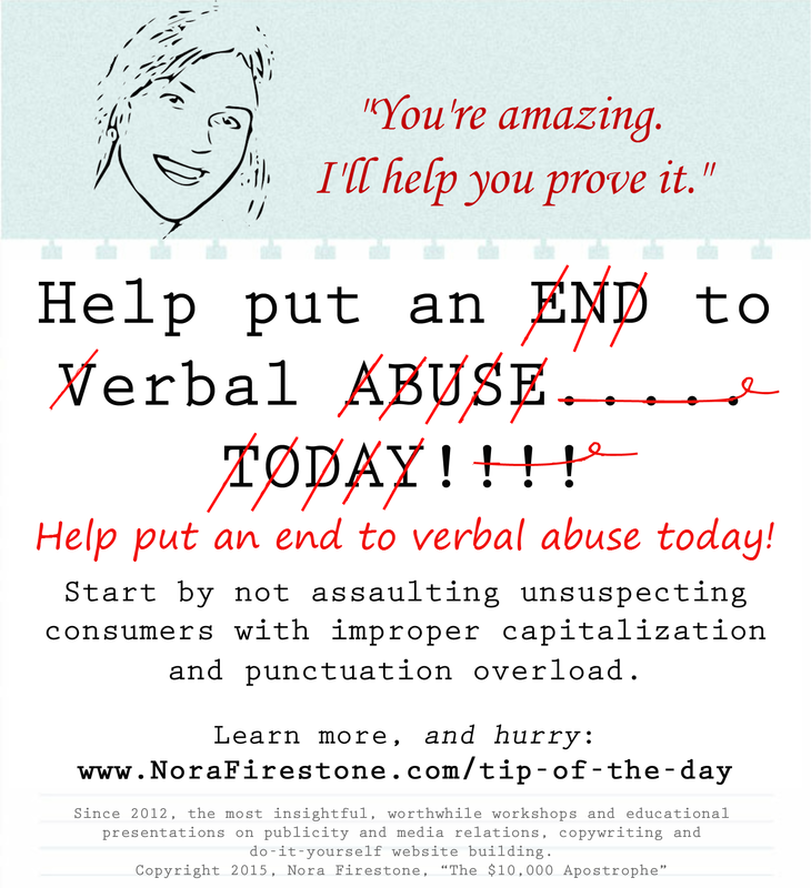Avoid the "Capital Offense" and Its Lasting Consequences
By Nora Firestone
I once received a marketing email that so effectively evoked the negative impact wrought by several common issues — primarily the misuse of capitalization and punctuation for emphasis — that it inspired the following article, a version of which appeared in “Inside Business” news journal in December 2013. For the sake of not embarrassing or identifying the messenger I have modified a few details.
I once received a marketing email that so effectively evoked the negative impact wrought by several common issues — primarily the misuse of capitalization and punctuation for emphasis — that it inspired the following article, a version of which appeared in “Inside Business” news journal in December 2013. For the sake of not embarrassing or identifying the messenger I have modified a few details.
The offender
|
The early-morning assault nailed my inbox with a blinding flash and deafening boom. It inflicted more damage than most.
I shielded my eyes from the glare of randomly, colorfully, highlighted text. I winced at the sight and sound of the all-caps clamor trumpeting the company’s FRESH-MADE pastries, which I could order via its NEW!!! website for FRIENDS, FAMILY, NEIGHBORS and others, and informing me that I’d ALSO receive A BOX! containing something special. The message gripped me — like a migraine. What did all the acronyms mean? Why all the noise and chaos? Oh. The messenger had capitalized for emphasis. And in case I had become immune to that effect, he’d try luring me into a visual circus and wearing me down by optical exhaustion. |
Why you shouldn't improperly capitalize and punctuate for emphasis
The misuse of capital letters for emphasis in the body of written content is so common that many assume that it’s correct and acceptable, and that, by virtue of its prevalence, it must signify effective marketing. Yet most consumers whom I poll report that they consider the use of all capital letters and other forms of audio-visual disharmony abrasive — or worse, obnoxious.
People hear what they read. They’re offended by the “yelling.” They’re not interested in “abuse” or hype; it’s all so tiring, draining. The moment they spot these offenses, many reject the entire message.
In addition, the tactic screams amateur to people who revere the rules of capitalization and clear communication. Capitalization is reserved primarily for proper nouns, sentence openings, initializing and acronyms. Every composer of a company’s public business messages should consider that his or her audience might include writers, editors, language teachers and natural obsessives. Disrespect the given language and you’re skating on thin ice with them.
People hear what they read. They’re offended by the “yelling.” They’re not interested in “abuse” or hype; it’s all so tiring, draining. The moment they spot these offenses, many reject the entire message.
In addition, the tactic screams amateur to people who revere the rules of capitalization and clear communication. Capitalization is reserved primarily for proper nouns, sentence openings, initializing and acronyms. Every composer of a company’s public business messages should consider that his or her audience might include writers, editors, language teachers and natural obsessives. Disrespect the given language and you’re skating on thin ice with them.
It’s OK to emphasize words, but not by way of improper capitalization and certainly not at the expense of the company’s professional image. As I state as the premise for my book The $10,000 Apostrophe, "Your written and spoken public messages should reflect the level of professionalism and attention to detail that people can expect to find in all other areas of your business." As I explained in a reply to the pastry man, “You don’t want people questioning your attention to detail in the kitchen based on your lack of attention to detail in your emails.”
To those charged with creating a company’s public messages, I recommend heeding the following short list of my professional guidelines:
To those charged with creating a company’s public messages, I recommend heeding the following short list of my professional guidelines:
- When it’s necessary to emphasize, do so sparingly and thoughtfully. As appropriate, use boldface or italics, which were designed for this purpose.
- Better yet, consider this: If you think you have to shout a word, you’re lacking full confidence in your readers’ abilities to understand the entirety of what you’ve written. Astute readers will recognize this. If you’re not confident about the effectiveness of your copy without the use of bombs and sirens, revise it. Choose more specific, active and illustrative words; avoid empty or vague adjectives. For example, consider the impacts of the following options on you, as a reader: “This event will be our BEST yet …” vs. “This event will establish new and uplifted standards for educating and inspiring …” Vague and empty, the word best hasn’t added anything of value. Why emphasize something of no value; why not replace it?
- Understand that one of a writer’s first priorities should be to be taken seriously as a communicator. Take cues from professional writers and highly qualified marketers who’ve acquired some type of formal education in the field. Habitually read professionally written copy from sources with high industry standards. Do not trust that most of what you read on the Internet, even on so-called professional platforms, has been written or edited by a knowledgeable professional! True professionals understand how and why to observe the rules of language in their messages.
Why had my pastry guy spent so much time developing and distributing a message that would essentially blind and deafen its recipients? I believe that he simply hadn’t paid as much attention to his message as he does to his fabulous desserts. I closed my reply to him with best wishes for the holidays and an invitation to call for some free advice. I just want the war to end. And I’d hate to see an enthusiastic baker flake out in the branding department. He’ll either accept the hand or reject it; the cannonball’s in his court. His next move will ring louder than his first.
There's plenty more to be said about the topic. Read more in "The $10,000 Apostrophe -- How to Avoid Some of the Most Common Errors in Public Business Messages, and Why It's Essential to Do So," to be released December 2015. Pre-order your copy today at www.norafirestone.com/ten-thousand-dollar-apostrophe



